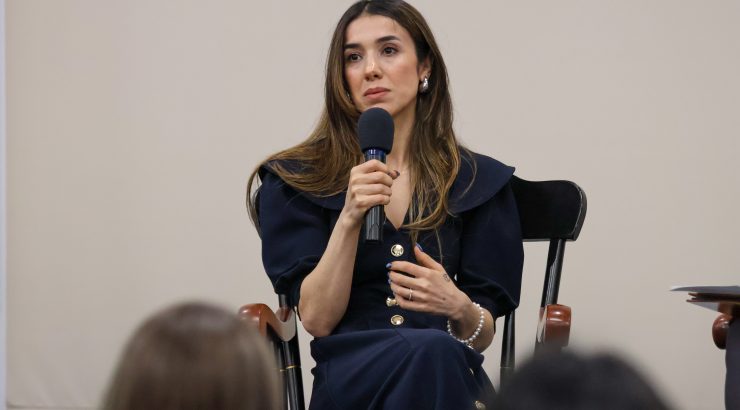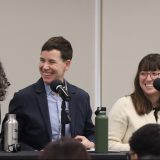
Nadia Murad Calls for Justice and Reparations for Survivors of Conflict-Related Sexual Violence
February 27, 2025

Presidential Fellow in Peace Studies, Nadia Murad (left) with Wilkinson College of Arts, Humanities, and Social Sciences Dean Jennifer Keene. Photo by Ava Brandt (’27 Creative Writing)
Chapman University welcomed back Human Rights activist, Nobel Peace Prize Laureate, and Presidential Fellow in Peace Studies at Chapman, Nadia Murad, for a talk titled, “Towards Justice: Reparations for Survivors of Conflict-Related Sexual Violence (CRSV).” Joining her via Zoom was Esther Dingemans, executive director of Global Survivors Fund (GSF) and a leading expert on developing and implementing survivor-centered programs addressing CRSV to begin the discussion hosted by the Department of Peace and Justice Studies and Wilkinson College of Arts, Humanities, and Social Sciences.
In previous visits to Chapman University, Murad discussed her experiences and survival of the 2014 Yazidi genocide by the Islamic State as detailed in her New York Times bestselling memoir, The Last Girl: My Story of Captivity, and My Fight Against the Islamic State. She also spoke about winning the Nobel Peace Prize with Dr. Denis Mukwege, and the founding of Nadia’s Initiative, a nonprofit organization dedicated to rebuilding communities in crisis and advocating globally for survivors of sexual violence. During this visit, she focused solely on the critical importance of providing both interim and comprehensive reparations for survivors of CRSV.
In 2019, Murad and Dr. Mukwege founded the Global Survivors Fund (GSF), an organization dedicated to giving survivors of wartime sexual violence direct support through five elements of reparations: satisfaction, rehabilitation, compensation, guarantees of non-repetition, and restitution.
“We came together [and asked] what we want to see changed at a global level as well as on the national level?” said Dingemans. “What stood out quite clearly was that there was one topic [that really needed] to be addressed, and that’s reparation.”
GSF recognizes that acknowledgment, compensation, and other elements of reparation are key for survivors to be able to rebuild their lives. They seek to support survivors by filling existing gaps, addressing not only the immediate needs of survivors but also their right to reparation through a variety of interim reparative measures projects, such as publishing a study on the perspectives of survivors of CRSV about reparations and the availability of different remedies and forms of reparation. Through the study, they learned that there is an urgent need to implement interim reparations for survivors, particularly providing medical and psychosocial support and livelihood support. Urgent interim reparation would allow governments to respond to survivors’ most pressing harms, with the expectation that a comprehensive administrative reparation program will be implemented in the future.
“I think it is so important that we find those women who their voices are not heard. We can’t bring about change without working with them,” said Murad.
Providing a space for survivors to voice their own needs for a hopeful future is not easy. “It’s really about time and patience,” Dingemans said, “We don’t rush with our programs. Sometimes, we’ve been working on setting up a project for a year without actually having delivered any concrete measures because it’s all-around trust building.”
Survivors need to know they can stay completely anonymous. In recent years, GSF has supported programming that allows survivors to safely approach a caseworker who could assess their situation and options. For example, Dingemans shared, “Survivors come to a beauty center where they will then meet a social worker, and that’s the sort of camouflage, so no one will know why they are going there. They think they go for beauty treatment. So, there’s all these different ways that you can build trust and make sure that survivors stay safe.”
Survivors of CRSV are part of the decision-making process with GSF from the very beginning as they decide what form of reparations they need. This process in itself is a reparation for survivors because their needs are the foundation for their support.
“When you work with survivors, you just know it’s going to impact generations and that the positive impact will last forever,” said Murad.
Murad and Dingemans hope to see a change in humanitarian settings that includes a discussion of reparation. They hope to see governments start drafting legislation and implementing reparation programs; however, they recognize the changes that have happened since GSF was launched.
“I think it’s remarkable in the last five years how much change we see already in international policy instruments in discourses. There is really more focus on reparation. And that’s encouraging,” said Dingemans.
(Photo in header: Chapman University Presidential Fellow in Peace Studies Nadia Murad. Photo by: Ava Brandt (’27 Creative Writing))

